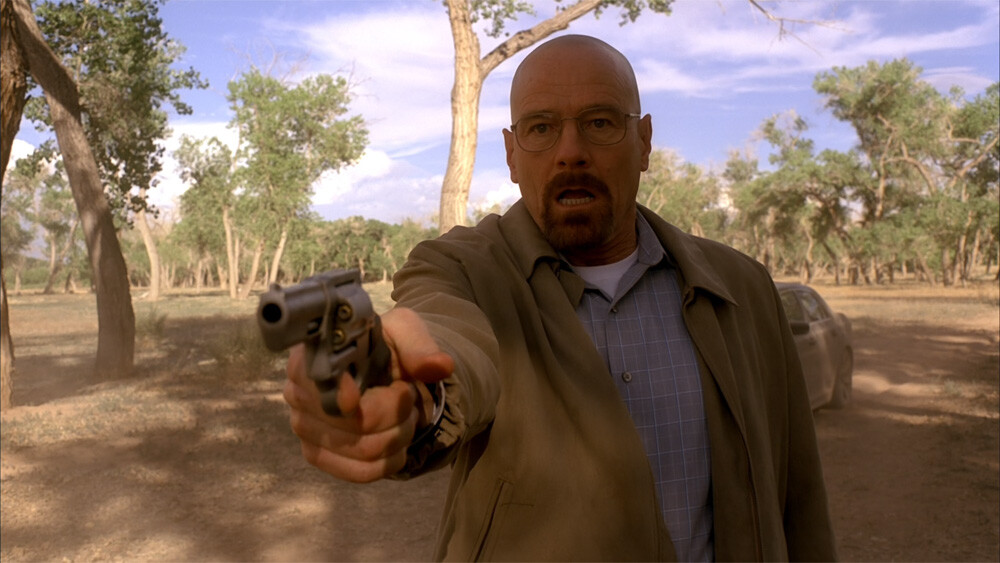There Was One Crime In 'Breaking Bad' That Everyone Ignored

Note: This article contains discussions of sexual assault.
Walter White is one of those characters who did some truly evil stuff and yet is very much idolized as an anti-hero. Along with Tony Soprano and Don Draper, he's an essential part of The Holy Trinity of Late 2000s Prestige Cable Sociopaths The Audience Roots For Dubiously.
Don't Miss
And even apart from the whole "murdered all those people" spiel and the “teamed up with Neo-Nazis” thing, there's one item on his rap sheet that everyone seems to ignore. Namely, that Walter White raped Skyler, his wife. Raped her repeatedly, in fact.
Walter White's Story Was An Escalating Series Of Attacks On The Weak And Innocent
Walter White's story was also an escalating series of attacks on the strong and guilty. Really, the story escalated in all kinds of ways. But the weak and innocent victims marked him turning bad, and yet these offenses never quite stuck, never quite came off as unforgiveable.
We saw him kill his first victim in season one (a drug dealer DEA informant), but it didn't seem so bad because this guy was planning on attacking Walt, to escape. Season two, he let Jesse's girlfriend Jane die, but he didn't actively kill her—and anyway, she was keeping Jesse from making meth for him, and we couldn't let her do that.

AMC
Season three, he engineered the death of lovable sidekick Gale, but he perhaps was doing so to ensure he himself wouldn't die. Then at the end of season four, he poisoned a kid, which was the last straw according to Jesse. But the kid didn't actually die, and Walt did this in a very clever manner, so we might forgive even this. Slate helpfully charts these and a bunch of lesser acts on a scale measuring both how evil and how badass each is, with these ones being quite evil and not very badass.
Walter had justifications for all these acts. Which is appropriate because he's a human being we're following, not some monster who exists only for us to hate. But the show is about the guy going bad, and we were still cheering him on as season four ended. He had to go further.
Then He Went After Skyler
In season five, Skyler learns Walt is not just a drug cook but a killer. An episode ends with her in bed. Walter strips and gets in.
She's motionless and silent as he speaks and explains their new normal: "You know, it gets easier. I promise you that it does." He starts foreplay. She doesn't respond. He gropes her breast. We cut to black.
And then what happens? He's satisfied by this and goes to sleep? Keep in mind, he's tried raping her before. It was the season 2 premiere, and we got a scene of Walter trying to have sex with Skyler despite her protestations, complete with him pulling her underwear down and her yelling "stop." It looks like he gets pretty far. Here, she's able to physically fight him off because she's not scared of him outside of this situation, unlike in season 5. Had she instead stopped resisting, he would have kept going.
The Aftermath Makes This Clearer
The next scene we see of them after the season 5 rape, Walt moves his things back into the house against Skyler's will. Earlier, she successfully kicked him out, but she now manages just a weak objection. The scene ends with Walt pushing half the underwear in her drawer to the side. When I first watched this episode, I seem to remember delighting in Walt reasserting control over his home.
We see Skyler traumatized in the following episodes as well. When Marie mentions Walt and praises him, Skyler reaches for a cigarette then blows up at Marie and cries. Most memorably, at Walt's birthday party, she walks into the pool and stays underwater. The terrifying figure of Walt comes in to retrieve her.
When I first saw these scenes, I took them as just her reacting to the whole Walt-is-a-murderer-and-I'm-trapped situation, and you might well interpret them the same way now. But the show at this point hasn't forgotten the rape, even if we never see the couple in bed together again. Says Skyler, later in the episode: "I don't know what to do. I'm a coward. I—I can't go to the police. I can't stop laundering your money. I can't keep you out of this house. I can't even keep you out of my bed."
To those who missed the earlier bedroom scene, that last line should be game-changing. To those who didn't, it's still game-changing because she says "I can't," not "I couldn't." The unwanted bed situation is ongoing.
If all this is obvious to you, and I'm just recounting a famous plot, sorry for wasting your time. But I missed it the first time I watched it, and over the past decade, I've heard so many takes that say "Stop rooting for Walter White, you crazies, he's a bad guy," takes that somehow don't seem to get around to mentioning the rapes. That helpful chart from Slate, for example, lists all those murders (and also joke offenses like tossing a pizza on the roof), but rape has no place on those axes. For comparison, check out the flood of rape discourse surrounding one scene in Game of Thrones—a scene of a brother and sister having sex atop the corpse of their son, the slain king, which is a situation not nearly as applicable to most viewers' lives.
I see a few articles about Breaking Bad's season two scene (articles angry that that scene isn't more remembered), but even those miss Walt making it routine three seasons later. Searching further, I can find just a couple forum comments about it. Thanks to YouTube, we can actually see people reacting to episodes as they view them (people with 2020s sensibilities, if that makes a difference), and here, everyone does seem to respond with disgust on seeing the relevant scenes. But it didn't stick in the minds of those people from a decade ago who tasked themselves with analyzing Walter White. Which is surprising because ...
Raping Your Wife Isn't Cool, Right?
That's a real question. Because most evil things main characters do are cool.
I don't just mean they're portrayed as cool. They are cool, using every standard of cool we have. They're immoral, sure, but the immoral character outsmarts people we dislike. They overpower those who seem stronger than them. They are brave. They act with skill. They break the law, and lawbreaking is cool because rules are uncool.

AMC
Yes. And I'm not mocking anything here, I'm just saying what's true.
Consider Scarface, for instance. Breaking Bad sure did—the same episode where Walt moves back in, he and his son watch the movie and cheer on Tony Montana. Skyler is horrified and can't respond, not even to tell Walt to maybe keep the baby away from the scenes of mass murder. We've previously poked fun at audiences for missing the point of Scarface's morality story. But the fact is, Al Pacino gunning down enemies is cool. Even the story condemning him and him being miserable doesn't undo that. When a main character goes bad, he fights and schemes and wins (and maybe dies, but that can be pretty cool too). He doesn't, like, clumsily sit on a cute dog, killing it, and that's it, story ends. Main characters rarely ever do something evil that's not at least a little cool.
Let me tell you about one who does. It's the main guy in season one of Fargo, so skip ahead if you don't want the show spoiled for you. Martin Freeman plays a timid man named Lester, and at the end of the first episode, he murders his wife. This is not the moment when we lose sympathy for him. His wife nagged him, you see, so even though we know murder is wrong in real life, we can revel in him finally standing up for himself. And anyway, he breaks down crying with regret afterward, and now he's a criminal needing to cover his tracks, so we're entertained watching him use his wits.

FX
By the end of the season, Lester's done a bunch more bad stuff. Time's passed, and he has a new wife now, one who's nothing but kind to him. About to flee the country with her, he needs to enter a building, and he fears an ambush. So he sends this loving wife in ahead of him, dressed like him to mislead anyone targeting him. An attacker does indeed mistake her for him and kills her.
This move by Lester is fascinating, if he's the lead character (maybe he isn't, which is why the show dared do this). It breaks not just every rule of ethics but the every rule of what makes a man, even a man who has embraced evil. He hurts someone he is supposed to protect. He's a coward—not moral cowardice, but plain too-afraid-to-fight cowardice. This is the sort of thing you give to your hateable antagonist, your King Joffrey maybe, not to the guy viewers started the show rooting for. And so I considered this plot unique. But wait. I'd forgotten that Walter White did something just like that in Breaking Bad.
It was the end of season 4. Walt wants to enter his home but fears an ambush, so he phones a neighbor and asks her to go in ahead of him. It's not exactly the same as Fargo—the ambushers leave when she enters instead of attacking her—but he still sends an innocent woman into danger because he's too scared to go himself. And I totally forgot this scene, because the episode's other set pieces overshadowed it. In fact, Walt may well have done a bunch of other spineless pathetic stuff I've forgotten because I just remember him ending his story intimidating billionaires, shooting Nazis, saving his protégée, and dying gloriously.
I began this section planning to explain that very few actions by a villain protagonist or antihero manage to be evil without also being cool. Even the most contemptible of Walt's murders come off as a little cool. Spousal rape, however, would not, which made this part of his story so notable. Raping his wife might strike viewers as even more despicable than some other hypothetical sex crime—if Walt, say, had sex with the disgusted sexy girlfriend of a rival drug dealer, that might leave an audience cheering, while watching him have sex with a frozen Skyler would not ("I wouldn't touch Skyler let alone rape her," said one Breaking Bad fan, revealingly).
But on second thought, the real lesson in all this may be simply that we'll forget any of a character's failings if it's followed up by something sufficiently badass. So ...
Walt Came Back From That In Our Minds
This season of Breaking Bad I've been talking about (technically half a season; the second half aired a year later) was my least favorite one when I first watched it. It just seemed unfocused, and I didn't know why. On rewatch, the craziest part about it is we spend the whole length out of Walt's point of view. He's the lead, but for these eight episodes, we're always just watching him, almost never in his head. This even goes for scenes where he's alone. The only exception, I think, is right after he kills Mike, and we see him surprised with himself.

AMC
That was surely intentional, and it sounds like a great way to make us consider Walt's actions from some distance (unless you're like me and were just waiting to see what train he'd rob next). That point-of-view choice also meant we never got to see Walt's own thoughts about continually sleeping with an unwilling Skyler. I don't know what such a scene would look like, just that we don't get it, other than those few seconds on Walt's face after Skyler says "I can't even keep you out of my bed." Then the season ends on a five-month time skip, after which the two of them seem to have reconciled. A lot can happen in five months. The entire first four seasons spanned just ten months.
And so we move on and forget. In one of the final episodes, when Walt and Skyler fight over a knife, it feels like a huge step, as though he never did anything nearly that bad to her before. That episode by the way, "Ozymandias," is the best one in the series, but it only works by playing a little loose with what the show's established. For example, Walt's maybe a hair more anguished at Hank dying than we'd expect based on what we know of him.

AMC
Speaking of Hank's death, Walt Jr. hates his father at the end of the show. He hates him for killing Hank, which is the one thing Walt didn't do. (Responsible for Hank's death? Sure, but Walt didn't kill him, and he actually tried to save him.) Now, imagine if when Walt phones Junior, instead of rebuffing him by saying, "You killed Uncle Hank," Junior says, "You raped mom."
Okay, I'm not saying they should have had him say that. I don't really see that working. Though, Junior does list among Walt's offenses "what you did to Mom." Presumably he's talking about the knife incident, but in our minds, it should have reminded us of everything he did to her.
It's good for characters in fiction to do bad things. Breaking Bad is a better story for having Walt do something so wrong that none of us admire, for saying this is a realistic step for someone like him. We've got to be perceptive enough to pick up on this stuff, even without the writers highlighting it or explaining it to us, and we often fail at that when the character's badassery overwhelms us.
Historically, there is only one confirmed case of fans turning against a lead character for his many offenses despite his continued confidence, strength, and flair. That character, of course, was the one Tobey Maguire played in Spider-Man 3. Symbiote Spider-Man was a triumph of both writing and acting, and I am working on the first installment of my essay series on him at this very moment.

Sony
Follow Ryan Menezes on Twitter for more stuff no one should see.